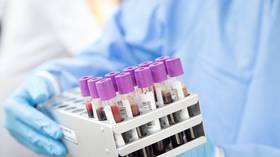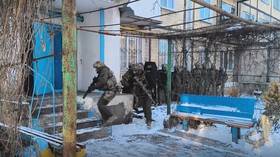New blood test can detect 5 types of cancer YEARS before current methods, researchers claim

After a decade of research and development, a new blood test has been produced which can detect five types of cancer years before currently available tests can, greatly increasing the future survivability of patients.
The creators of the test, dubbed PanSeer, caution that it is unlikely to predict cancer, but can warn asymptomatic people of cancerous growths far earlier than current methods allow.
The new test is based on a biological process called DNA methylation analysis, which hunts down specific DNA signatures that correspond to different forms of cancer, including in the stomach, esophagus, colon, lungs and liver.
Also on rt.com Russian scientists develop ‘groundbreaking’ method to ‘trick’ immune system and make nano-drugs more effectiveThe research drew on a 10-year study of 120,000 people in China between 2007 and 2017, focusing on blood samples taken from 600 individuals at regular intervals.
Of this sample group of participants, some 191 people were eventually diagnosed with cancer. The scientists used the new test to analyze samples from four years prior to their diagnosis, and detected cancers in 91 percent of participants who were asymptomatic at the time those samples were extracted.
“The ultimate goal would be performing blood tests like this routinely during annual health checkups,” said Kun Zhang, UCSD Bioengineering Department chair.
“But the immediate focus is to test people at higher risk, based on family history, age or other known risk factors.”
Also on rt.com New cancer detector that’s 10 times more sensitive than current methods could pave way for at-home testingThe authors cautioned that more testing over a longer time frame is required before the new method can be considered for widespread clinical use.
Early detection is hugely important to improving rates of survival as it allows intervention, like surgery, chemotherapy and hormonal therapy, to begin before tumors have a chance to spread elsewhere in a patient’s body. Cancer in all forms accounts for nearly 10 million deaths per year worldwide.
Think your friends would be interested? Share this story!














